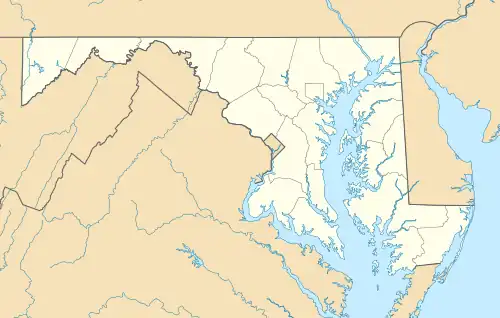Bethesda Meetinghouse | |
 Front elevation, 2008 | |
  | |
| Location | 9400 Wisconsin Ave., Bethesda, Maryland |
|---|---|
| Coordinates | 39°0′35″N 77°5′54″W / 39.00972°N 77.09833°W |
| Area | 0 acres (0 ha) |
| Architectural style | Greek Revival, Queen Anne |
| NRHP reference No. | 78003557[1] |
| Added to NRHP | July 17, 1978 |
The Bethesda Meeting House is a historic Presbyterian church complex in Bethesda, Montgomery County, Maryland, US. Its name became the namesake of the entire surrounding community in the 1870s. It sits on Maryland Route 355 (known as Rockville Pike at this point) just inside the Capital Beltway. It has been listed on the National Register of Historic Places since 1977.[1]
Description
The Bethesda Meeting House property includes the 1850 meeting house itself, the mid-late 19th-century parsonage to the south, and the associated cemetery. The church is a large, wood-frame structure built in the Greek Revival "temple" form, albeit with Gothic-style windows. To the south of the church is a two-story frame Victorian parsonage built on a cruciform plan, with some Queen Anne-style embellishments.[2]
History
The church was built on the foundation of an 1820 Presbyterian church that burned down in 1849. Opened in 1850, it served as the Bethesda Presbyterian Church until 1925, when the congregation erected a new church on Wilson Lane, farther south in Bethesda. When the church moved to its new location in 1925, the trustees sold the building and 7 acres (2.8 ha) of land to Mrs. May Fitch Kelley. The Presbyterian congregation, however, retained ownership of the cemetery.[2]
Mrs. Kelley lived in the church building for many years. In 1945, the property was sold to a French Algerian Catholic missionary group called the Missionaries of Africa, commonly known as the White Fathers. In the 1950s, the property was transferred again, this time to the trustees of the Temple Hill Baptist Church.[2]
Legacy
In the 1860s, the church's pastor, Rev. Edward Henry Cumpston, began lobbying the local postmaster, Robert Franck, to rename his post office from "Darcy's Store". Franck did so in 1871, and the surrounding community took the name as well.[3]
References
Citations
- 1 2 "National Register Information System". National Register of Historic Places. National Park Service. July 9, 2010.
- 1 2 3 Rev. and Mrs. William B. Allen and Michael Dwyer (August 1976). "National Register of Historic Places Registration: Bethesda Meeting House" (PDF). Maryland Historical Trust. Retrieved 2016-01-01.
- ↑ Offutt, William; Sween, Jane (1999). Montgomery County: Centuries of Change. American Historical Press. pp. 161–162.
Other sources
- The Spirit of Captain John, by Eugene and Edythe Clark, Carlton Press, New York, NY, 1970
- Old Bethesda by Dorce Germaine Holman and Not So Old, by Gertrude D. Bradley, Franklin Press, Gaithersburg, MD, 1956
- Bethesda: A Social History, by William M Offutt, The Innovation Game, Bethesda, MD, 1995
External links
- Bethesda Meeting House, Montgomery County, Inventory No.: M: 35-5, including photo in 1974, at Maryland Historical Trust website
- Bethesda Meeting House, history of Bethesda Meeting House at allBethesda.com
- Bethesda Presbyterian Church

